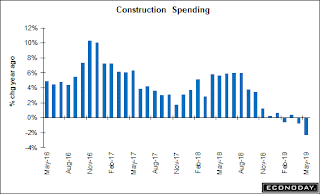The Mortgage Corner
Happy 4th of July, everyone, even though it looks like we are nearing the end of this housing cycle; and maybe this business cycle as well. But we can still celebrate what is now the longest recovery from any recession since WWII.
This Case-Shiller Home Price Index may summarize the housing market going forward. Its 3-month average of same-home prices has been declining since last year. The priciest housing markets like Seattle and San Francisco have risen the least, while Las Vegas and Phoenix that were hit the hardest because of overbuilding during the housing bubble show the sharpest increases.
The S&P CoreLogic Case-Shiller U.S. National Home Price NSA Index, covering all nine U.S. census divisions, reported a 3.5% annual gain in April, down from 3.7% in the previous month. The 10-City Composite annual increase came in at 2.3%, up from 2.2% in the previous month. Las Vegas, said the report.
Phoenix and Tampa reported the highest year-over-year gains among the 20 cities. In April, Las Vegas led the way with a 7.1% year-over-year price increase, followed by Phoenix with a 6.0% increase, and Tampa with a 5.6% increase. Nine of the 20 cities reported greater price increases in the year ending April 2019versus the year ending March 2019.
Another marker is new-home sales, which feeds into the GDP report. It plunged in May, down to 626,000 annualized units, vs. 673,000 in April. Prices also fell sharply, down 8.1 percent on the month to a median $308,000. Year-on-year, the median is down 2.7 percent and right in line with the 3.7 percent decline in sales.
The reasons for its weakness are many. Fewer newly-adult Millennials—the largest population cohort—are buying homes because of soaring student debt and fewer entry-level homes on the market.
And consumer confidence is also sinking. The Conference Board’s Confidence Index just declined from 134.1 to 121.5 in June, a huge drop after two months of increases.
“The escalation in trade and tariff tensions earlier this month appears to have shaken consumers’ confidence," said the Conference Board. "Although the Index remains at a high level, continued uncertainty could result in further volatility in the Index and, at some point, could even begin to diminish consumers’ confidence in the expansion.”Confidence in jobs also showed a slight decline, said the report, and may be a predictor of weakness in Friday’s unemployment report.
This may be a temporary blip, as the Federal Reserve has hinted that it may begin to drop short term interest rates at their July FOMC meeting. And mortgage rates are again at rock-bottom. So more consumers may reverse course and jump back into housing purchases.
They will face a declining supply, however. Econoday summarized the current
construction industry with these comments:
“Residential spending fell 0.6 percent in May and now shows declines each month this year. Compared to May last year, residential spending is down a very steep 11.2 percent. Single-family homes, the dominant category on the residential side, fell in May and are down 7.6 percent on the year. The one residential plus is new multi-family homes which, reflecting demand tied to high costs for single-family homes, are up 9.3 percent.So if very low interest rates can’t sustain housing sales, what can? We seem to be nearing the end to this recovery from the Great Recession in its record-breaking 11th year.
Harlan Green © 2019
Follow Harlan Green on Twitter: https://twitter.com/HarlanGreen



No comments:
Post a Comment